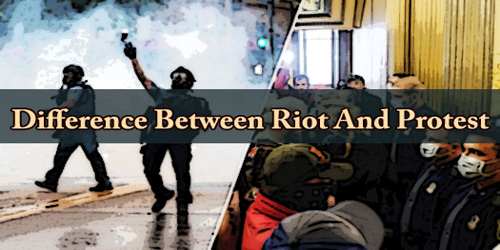Riot, in legal code, a violent offense against public order involving three or more people. Like an unlawful assembly, a riot involves a gathering of persons for an illegal purpose. A protest is an organized public demonstration to specific objection to a political decision or course of action. These are usually lawful and peaceful. The world has witnessed many protests and riots since ages ago. This happens as a result of the numerous dissatisfying moments in life regarding events, situations, and policies. These directly affect people’s lives in areas like careers, politics, education, and governance, just to call some. This dissatisfaction is either expressed in riots, protests, and demonstrations. Although used simultaneously, riots and protests differ in various ways.
Definition of Riot –
A riot is a form of civil disorder commonly characterized by a group lashing out in a violent public disturbance against authority, property or people. Riots typically involve theft, vandalism, and destruction of property, public or private. The property targeted varies depending on the riot and the inclinations of those involved. Targets can include shops, cars, restaurants, state-owned institutions, and religious buildings.
These types of activities are common among disorganized and unruly groups and often result in the use of the police by the use of tear gas and CS gas to control rioters. Due to the bad economic effects experienced during and after riots, rioting is a crime punishable by law.
Definition of Protest –
A protest does not automatically suggest something violent and very disorderly but a riot gives a clear picture of chaos, disruption, violence, confrontations, and many times, injuries and bodily harm. Protests can take many different forms, from individual statements to mass demonstrations.
Protestors may organize demonstrations in an exceedingly bid to create have their opinions heard, influence government policy or belief or in a trial to enact certain changes themselves. Protests may be done through rallies, vigils, marches, motorcades, and boycotts, just to say some. In accordance with the constitution, this can be an inalienable right, and no arrests should be made against protectors.
The key difference between riot and protest –
‘Riot’ and ‘Protest’, both are an expression of dissatisfaction in events, situations, and policies
Riot:
- Riot is a public act of violence by an unruly mob. It is a state of disorder involving group violence.
- Riots involve violence, vandalism, theft as well as the destruction of public or private property.
- Riots are categorized as a crime and are punishable by law.
- To engage in the riot; to act in an unrestrained or wanton manner; to indulge in excess of luxury, feasting, or the like; to revel; to run riot; to go to excess.
- A riot is what a protest can turn into if the participants are angry enough, and lacks enough self-restraint to refrain from such illegal and violent action.
- Riots can be apolitical, they happen after sporting events. They involve the destruction of public property and brawling, some mob violence.
Protest:
- A protest is a peaceful public display of disapproval or displeasure carried by chanting and marching in public.
- To make a solemn declaration or affirmation of; to proclaim; to display; as, to protest one’s loyalty.
- Protests are peaceful and involve peaceful chanting and marching in public.
- Protests are inalienable rights and no arrests should be made against peaceful protectors.
- A protest is an organized public demonstration to express objection to a political decision or course of action. These are usually lawful and peaceful.
- Protest can take so many forms- boycotts, marches, gatherings with signs, conscientious objector, symbolism.
To avoid the destruction of property and the violence associated with riots, people need to hold peaceful protests where they feel dissatisfied.
Information Sources:
















